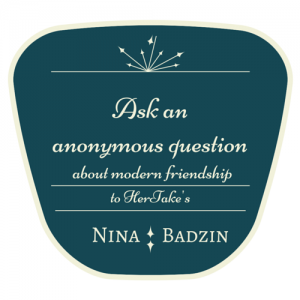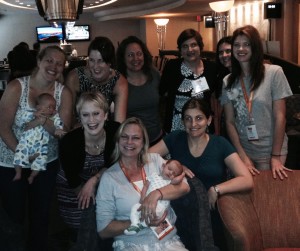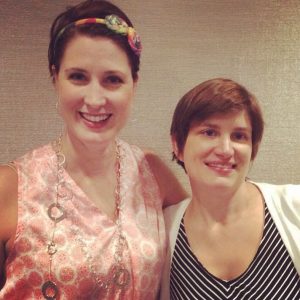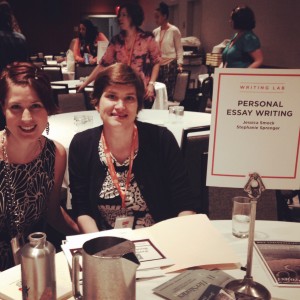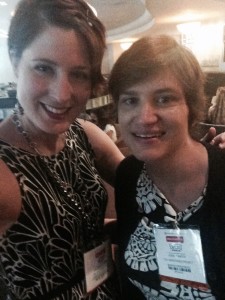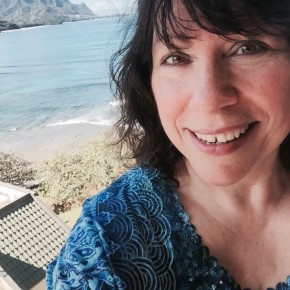HerTake: Your Friend, Not Your Free Editor
Today’s question comes from a writer who feels that friends and acquaintances who ask for “quick” editing help for their writing projects or their teens’ college essays, for example, are taking advantage of her friendship. We bet that readers from many professions can relate.
Do you have a question for Nina? Use our anonymous form. You can read Nina’s answers to past questions here.
Dear Nina,
I am a writer with print and online credits and a blog. However, I think my question applies to lawyers, doctors, nutritionists, physical trainers, or really anyone with a business that relies on expertise.
Let me start by saying that I consider myself a generous and attentive friend, but I am struggling to know where the line is between allowing myself to be taken advantage of and helping my friends.
Here’s the situation: Friends and acquaintances often ask me to “take a look at” (in other words, help with) their writing or their kids’ writing. I’m talking about college admission essays, special occasion speeches, blog posts, articles, or even basic emails. I also have acquaintances who want to get into the publishing business, perhaps as a blogger, who send me their essays to read, ask for detailed feedback and sometimes for the names of the magazine and site editors I’ve worked with in the past. Sometimes it truly is a just quick read and I’m happy to help. Other times, the editing or publishing advice requires much more of my time and energy than I am comfortable giving, but I have a hard time saying no.
I don’t want to resent my friends, but I don’t feel comfortable asking for some kind of payment, especially since I’ve never set up an official editing business. Do you think it’s okay to charge my friends/acquaintances for this type of help even though I do not run an editing business and do not necessarily want to run an editing business? I’m not sure how I can explain to a friend that at some point as I’m helping her kid with a college admissions essay, for example, that I’d want to be compensated for my time.
As an aside, I have a few “go-to” writers who edit my work every now and then, but it is almost always reciprocated eventually. I look over their work, they look over mine. It’s an unspoken, equal arrangement. I am referring to something different with these other requests. My main question is this: What is the best way to let a friend know that she (or he) has crossed a line from asking for a quick favor to taking advantage of me?
Thanks for any advice,
Your Friend, Not Your Free Editor
Dear Your Friend, Not Your Free Editor,
Thank you for this question! I have the same problem, but receiving your question really pushed me to think more about how I want to handle these writing/editing favors in the future. People ask me for the same sort of help you’ve described: “the quick looks” that include emails back and forth for days even when I think I’ve said all there is to say; the college admissions essays that I don’t feel quite right about helping with anyway; the publishing and blogging advice; and in my case, advice about Twitter and other detailed social media questions. I don’t mind giving a quick read and an overall opinion or a quick look at a site or a Twitter feed, but when it starts getting to the paragraph-by-paragraph questions or more involved strategy questions (for social media or blogging), then I feel like I’m spending time that could and should be billable, or spent on my own work, or not spent on my computer.
To tell you the truth, I had a hard time even writing the previous paragraph because, like you, I consider myself a generous and helpful friend. Also like you, I’m not particularly interested in starting a business nor am I all that good at saying no. Alas, you and I have the same questions. How do we charge our friends and acquaintances if we weren’t intending to run a business? But, how do we not charge them if we want to help without resenting the time we’re spending?
Since I’ve had little success solving this issue before now, I asked a version of your question on Facebook. Several writers chimed in to say they have the same problem. It’s no surprise that the most solution-oriented answer came from a friend who is not a writer!
My friend Steven said: As a lawyer I am somewhat familiar with the situation of being asked for advice. One thing that I think helps is knowing what you and/or your time is worth (and having it written down). That way, when someone asks you for help, rather than saying, I’ll think about it,” you can say, “I’d be happy to help, I typically charge $50 per hour or $100 for a project, so let me know what you think would be in your budget.” Even if you end up charging a lot less, or nothing, it sends a powerful message that you are doing more than a favor.
Steven also suggested the following as another possible response to a request for help: “My hourly rate, is over $150 per hour. For a friend I’m always happy to give you the first hour or two of my time, but after that I really need to charge.” Again, this creates a much better dynamic between the professional and the potential client. Another thing often done in billing is to charge the full amount, but then give discounts. This again reflects the true value of the service you’re providing.
A professional writer and editor I know, Hila Ratzabi, also said something that felt right and showed how taking ourselves seriously and valuing our expertise and time is the first step. Hila said, “Friends who respect my work insist on paying.” I suspect that Hila respected herself and her time before she expected anyone else to do the same. I think Hila’s and Steven’s responses go hand-in-hand.
A related story: one writer friend (who is also a lawyer) is the only one who has ever insisted on paying me for my editing time. We set up a structure for her to pre-pay for a few hours, which made her feel more comfortable emailing with revisions and questions and cover letters. My level of help to her was significantly better and more helpful than my free “quick looks” that I did as favors. She encouraged me to make a page on my site to advertise my services, but I was nervous that I’d end up doing more editing than writing. Your question, however, reminded me that having that information organized and written down is important, even if I just take on a few clients a year.
Your Friend, Not Your Free Editor, I’m giving us both an assignment.
- Recognize the monetary value of our time and experience. We must recognize that the years we have spent writing, editing, blogging, and getting our work published is worth something. To echo Steven, it is more than a little favor when a friend asks for that expertise for free.
- Pricing! While it might be hard to put a number on our experience and time, we can certainly research what is standard in the freelance editing and social media consulting world and charge accordingly. (I’ve seen anything from $50-200/hour.) I liked Steven’s idea of giving discounts or giving away the first hour, but making it clear what our time is worth.
- Write it all down! We need to create a one-page document that lists our services and our rates (on mine, I would also include the social media piece). That document can exist on our sites or simply on our desktops to forward to anyone who inquires. I don’t think that creating this document or sharing it means we are now editors by trade instead of writers. It’s simply a logical solution to a problem. Also, the extra cash would be nice!
- Learn to say no! If we absolutely do not feel like we can charge our friends, then we both need to get better at saying no to the request in the first place. Easier said than done, I know.
Good luck to you! And to me!
I know there are readers out there who can commiserate or can tell us how they solved this problem. Please let us know in the comments.
Until next time,
Nina

